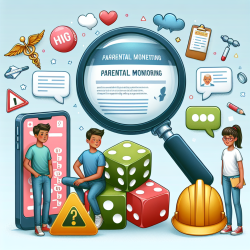In a world where young people are increasingly exposed to risky behaviors, the role of parents and guardians becomes ever more crucial. Recent research conducted in Dar es Salaam, Tanzania, highlights the significant impact that parental monitoring can have on promoting safe sexual practices among secondary school students. This study is a call to action for parents and educators to engage more actively in the lives of young people to curb the prevalence of HIV and other sexually transmitted infections (STIs).
The Study's Findings
The research conducted among 2,217 students aged 15 to 24 years revealed that a considerable number of these students engaged in risky sexual behaviors. Alarmingly, 41.1% of sexually active students did not use a condom during their last sexual encounter. However, the study found that increased levels of parental monitoring were associated with higher condom use among male students.
Understanding Parental Monitoring
Parental monitoring involves parents being aware of their children's whereabouts and who they are associating with when not at home or school. This level of involvement can deter young people from engaging in risky behaviors by instilling a sense of accountability and care. The study suggests that male students who experienced higher levels of parental monitoring were more likely to use condoms during sexual intercourse.
The Role of Communication
While parental monitoring showed positive results among male students, the study also examined the role of parental communication. Unfortunately, communication between parents and children about sexual health did not show a significant impact on condom use. This could be attributed to cultural taboos surrounding discussions on sexual health in Tanzania. Many parents may lack the necessary skills or feel uncomfortable discussing these topics with their children.
Implications for Practitioners
The findings from this study provide valuable insights for educators and health practitioners working with young people. Here are some strategies practitioners can implement based on the study's outcomes:
- Encourage Parental Involvement: Educators should facilitate workshops and seminars that educate parents on the importance of monitoring their children's activities and associations.
- Cultural Sensitivity Training: Practitioners should receive training to understand cultural norms and how they can effectively engage parents in discussions about sexual health without offending cultural sensibilities.
- Create Safe Spaces: Schools should provide safe environments where students feel comfortable discussing sexual health issues with trusted adults.
- Promote Open Communication: Encourage open dialogue between parents and children about sexual health by providing resources and support for effective communication strategies.
The Path Forward
This research underscores the need for targeted interventions that involve both parents and educators in promoting safer sexual practices among young people. By enhancing parental monitoring and improving communication strategies, we can reduce risky behaviors and promote healthier outcomes for future generations.
If you're interested in exploring this topic further or implementing these strategies within your practice, consider conducting additional research or collaborating with local organizations focused on youth education and health.










